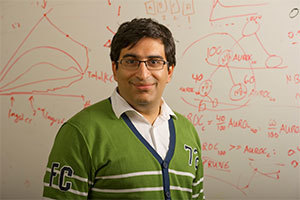 Nitesh Chawla
Nitesh Chawla
A new study by researchers from the University of Notre Dame and Tsinghua University offers great potential for understanding the social principles that underpin the highly connected world, from individuals to groups to societies.
Nitesh Chawla, Notre Dame’s Frank Freimann Collegiate Associate Professor of Computer Science and Engineering and director of the University’s Interdisciplinary Center for Network Science and Applications (iCeNSA), points out that knowledge of social strategies in networks offers great potential for understanding the evolution and dynamics of social networks. This has applications from telecommunications to marketing to disaster management to epidemiology.
Chawla and his fellow researchers sought to unveil the demographic-based social strategies people use in their networks and developed models to automatically infer users’ demographics based on their daily communication behaviors. Their study is based on analysis of a real-world, large mobile network from a non-American country containing more than 7 million anonymized users and more than 1 billion communications events (voice calls and text messages).
“The key aspect of our work is that just with the knowledge of the structure of the social network, we are able to accurately infer social strategies and demographic information such as age and gender,” Chawla said. “We had no identifying information about users available in our data.”
The researchers developed what they refer to as the “WhoAmI” method to predict gender and approximate age of the user.
“The proposed WhoAmI method is a graphical model-based machine learning algorithm,” Chawla said. “Compared with the traditional machine learning algorithms where only the correlations between demographics and attributes of each user are considered, the WhoAmI method can also model the structural correlations between different users.”
Among the key findings of the study are that young people are active in broadening their social circles, while seniors tend to keep small but close connections. Also, people’s attention to opposite gender connections quickly disappears after age 35, while the insistence and social investment on same-gender social groups lasts for a lifetime.
“The discoveries characterize the properties of human communications regarding the demographic profiles and further show us how the social strategies change over time across one’s lifespan,” Chawla said.
“Mobility and communication data along with the population and economic data indicators can be leveraged to study a variety of questions and hypotheses on the impact of socio-economic factors in the formation of social networks, beyond standard applications in telecommunication from a consumer modeling and marketing standpoint,” Chawla said. “Knowledge of the social strategies along with additional socio-economic data can allow us to model the flow and migration of the workforce vis-à-vis the socio-economic conditions of different regions of the country. Knowledge of the social strategies in a region can also help with how diseases may spread or disaster response and management may be constructed. Our work can be married with the WHO Flunet data, for example, to provide more insight about how structure of social networks, as driven by demographics, may impact disease spread.
“We can also study how healthy behaviors and habits spread through social structures responding to different social strategies. With the iPhone 6 now offering built-in health tracking activities, this can become a reality.”
The researchers would like to continue exploring human interactions via computational social science, the interdisciplinary area of network science, social theory and data mining.
“Specifically, we would like to characterize human communications in terms of socio-economic and cultural conditions,” Chawla said. “This direction would truly put our research into practice.”
The study appears in the 20th ACM SIGKDD Conference on Knowledge Discovery and Data Mining, which is a premier interdisciplinary conference on data science, data mining, knowledge discovery and big data. The 2014 theme of the conference was “Data Science for Social Good.”
In addition to Chawla, the research team included Yuxiao Dong and Yang Yang of Notre Dame’s Department of Computer Science and Engineering and iCeNSA, and Jie Tang and Yang Yang of the Department of Computer Science and Technology at Tsinghua University.
Contact: Nitesh Chawla, 574-631-1090, nchawla@nd.edu